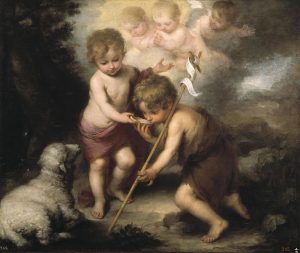Thoughts on Sunday’s Lessons for Dec. 6, 2020
First Reading: Isaiah 40:1-11
God is coming, so make the way ready. God is coming, so make ourselves ready.

The Holy Children, John and Jesus, drinking water from a shell (c.1670), painting by Bartolomé Esteban Murillo (1617-1682). Prado Museum, Madrid. (Click image to enlarge.)
This Advent theme, reinforcing last week’s readings, comes full circle this Sunday, beginning with the Prophet Isaiah and returning in the opening verses of the Gospel according to Mark. Last week’s Isaiah reading took us to the end of the book, when the people have come home to a devastated Jerusalem, filled with fear and hope. This Sunday’s verses – familiar through their use in Handel’s beloved “Messiah” – are set in exile, with the people looking forward to their return home. Using a poetic image of a gentle, maternal Messiah who holds the lambs closely and gently leads the mother sheep, the prophet prays that God will comfort us, lead us like a shepherd, gather us like lambs in God’s protecting arms.
Psalm: Psalm 85:1-2, 8-13
Sunday’s Psalm shares the joyful hope that we hear in the Isaiah reading. The Psalmist remembers the people’s time in exile, and rejoices that God did, indeed, come to the people with comfort and peace. Even though the people had been sinful and broken their covenant with God, God forgave their iniquity and blotted out all their sins. The straight highway that was built at Isaiah’s command has become a path for God’s feet.
Second Reading: 2 Peter 3:8-15a
The short second letter in Peter’s name, the latest epistle in the New Testament, was likely written a century or more after the crucifixion. After so long, Christ’s expected return had surely become a concern for the early church. What did this delay mean? Perhaps God’s time is not like our time, the writer suggests in the letter’s closing lines. They echo a theme in the Isaiah reading: “One day is like a thousand years, and a thousand years like one day.” Still, be patient, the author urges God’s people. Live holy and godly lives. Be at peace, and wait for God.
Gospel: Mark 1:1-8
Think about this: These words, the first words of the first Gospel written, were set down perhaps 40 years after Jesus died on the cross, around the time that the Romans destroyed Jerusalem and the Temple. Mark begins with no mention of the birth of Jesus or of his death and resurrection. Rather, he declares the good news of Jesus Christ, the Son of God, then immediately introduces John the Baptist, who proclaims Isaiah’s prophesy of a messenger who will make the way straight. Jesus, John says, is so powerful that John is not worthy to stoop down and untie his sandals. John declares that he baptizes with water, but that Jesus will baptize us with the Holy Spirit!
